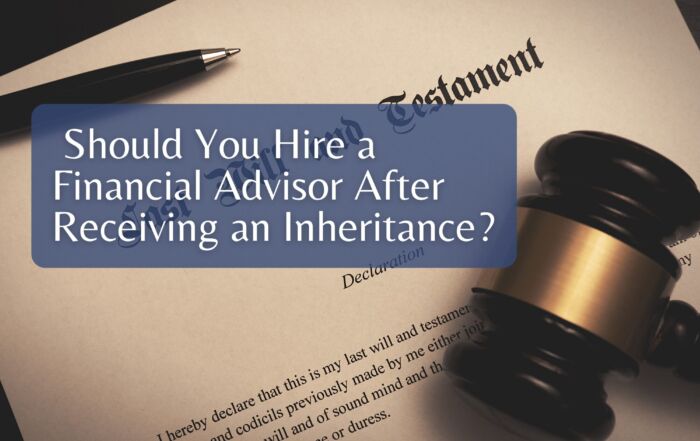Why Proper Asset Titling is Critical for Estate Planning

Many times, I have seen a carefully crafted estate plan that looks great on paper, but when you dig into the details, it is not accomplishing what was intended. It is critical that the titling of the assets and the beneficiaries are set up to follow what was outlined in the documents and the overall plan. Often, improper titling of assets can have unintended consequences, including more taxes.
Understanding Titles and Beneficiary Designations
There are certain titles and beneficiaries that bypass the Will and trust language that you should be aware of. Beneficiary designations listed on retirement accounts, life insurance, and other types of accounts bypass the Will (unless directed to the estate—which comes with nuances) and, therefore, go directly to the designated beneficiary.
For example, I’ve had many clients say their estate planning is in order because their Will is updated, but all their assets are in retirement accounts, meaning none of the assets are even going through the Will. Sometimes, this is not an issue, but other times it does not work.
Beneficiary Designations and Trusts for Minor Children
Let’s say your children are young adults, under 25. In your Will, you’ve established Trusts for your children in case your spouse predeceases you. In these Trusts, you’ve stated that the Trustee (who you’ve named and trust to control the assets) can use the assets to support them, but to protect them, they won’t receive the assets outright until various ages—perhaps 1/3 at age 25, ½ at age 30, and the remainder at age 35. This is a common practice to leave assets in a Trust and delay giving them outright to our heirs.
However, you named your spouse as the primary beneficiary and your kids as contingent beneficiaries on your retirement accounts and life insurance policies. If both you and your spouse pass away, those assets bypass the Trust altogether and go directly to the children, as the beneficiary designations supersede the Will.
The Impact of Joint Tenancy on Your Estate
Another consideration of titling is joint tenants. A joint account bypasses the Will and passes outright to the surviving tenant. This can simplify the transfer of assets, and in the case of a spouse, it may be fine. But there are many considerations.
For example, I often see an aging parent add one of their children to a bank account or another asset to make it easier for that child to help manage their finances (though there can be potential gift tax issues with this approach). I generally do not recommend this, as it can lead to numerous problems and family turmoil. If the parent passes, the surviving tenant (in this case, the grown child) receives all the joint property outright, regardless of the Will. The other heirs are left with nothing, and the surviving tenant is not required to divide it among family members as specified in the Will.
Estate Planning Issues in Second Marriages
Another common issue arises in second marriages. Often, estate planning documents name your children from a previous marriage to receive some or all of your assets, either when you pass or when your new spouse passes. You might even establish a Trust in your Will for the surviving spouse to use the assets during their lifetime, with the remaining assets passing to your children afterward. This is a sound plan in theory.
But if you’ve titled all your bank accounts, home, and brokerage accounts jointly with your new spouse, and named your spouse as the outright beneficiary of your life insurance and retirement accounts, everything will go directly to the surviving spouse upon your passing. They can then direct the assets however they wish through their own estate planning documents. In this scenario, you have unintentionally disinherited your children, as none of the assets passed through the Will, and no Trusts were established.
The Importance of Working with Professionals
There are countless other considerations related to taxes, asset direction, liability, protection from divorce (for you or your children), and naming trusted individuals to control the assets. While we can’t cover all scenarios, the key takeaway is that when you create an estate plan, you must carefully consider where your assets are held and how they are titled to ensure the plan is complete.
Simply drafting a Will through legal services or a friend may not accomplish what you intend. It’s crucial to work directly with your financial advisor and estate planning attorney to establish a comprehensive plan and revisit it often to ensure nothing has changed.
Click here to schedule a complimentary consultation to discover how we can help you achieve financial success.
Shawna Theriault, CFP®, CPA, CDFA®
Senior Financial Advisor, Wiser Wealth Management
Share This Story, Choose Your Platform!
Wiser Wealth Management, Inc (“Wiser Wealth”) is a registered investment adviser with the U.S. Securities and Exchange Commission (SEC). As a registered investment adviser, Wiser Wealth and its employees are subject to various rules, filings, and requirements. You can visit the SEC’s website here to obtain further information on our firm or investment adviser’s registration.
Wiser Wealth’s website provides general information regarding our business along with access to additional investment related information, various financial calculators, and external / third party links. Material presented on this website is believed to be from reliable sources and is meant for informational purposes only. Wiser Wealth does not endorse or accept responsibility for the content of any third-party website and is not affiliated with any third-party website or social media page. Wiser Wealth does not expressly or implicitly adopt or endorse any of the expressions, opinions or content posted by third party websites or on social media pages. While Wiser Wealth uses reasonable efforts to obtain information from sources it believes to be reliable, we make no representation that the information or opinions contained in our publications are accurate, reliable, or complete.
To the extent that you utilize any financial calculators or links in our website, you acknowledge and understand that the information provided to you should not be construed as personal investment advice from Wiser Wealth or any of its investment professionals. Advice provided by Wiser Wealth is given only within the context of our contractual agreement with the client. Wiser Wealth does not offer legal, accounting or tax advice. Consult your own attorney, accountant, and other professionals for these services.





